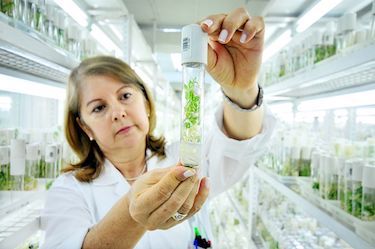 The health sciences have expanded to include a variety of professional health services from therapeutic services to biotechnology research. At the same time, science and technology has become intertwined within healthcare professions. At the core of careers in health science are themes of Science, Technology, Engineering and Math (STEM), that are incorporated into the study and practice of healthcare. The scope of STEMs role in healthcare is such that health science is an umbrella that is now practically all-encompassing.
The health sciences have expanded to include a variety of professional health services from therapeutic services to biotechnology research. At the same time, science and technology has become intertwined within healthcare professions. At the core of careers in health science are themes of Science, Technology, Engineering and Math (STEM), that are incorporated into the study and practice of healthcare. The scope of STEMs role in healthcare is such that health science is an umbrella that is now practically all-encompassing.
Professionals may seek a career in the health sciences if they are interested in working as a nutritionist, or as an athletic coach, as a pharmacist, or as a nurse. Health sciences offer careers in a variety of settings, with a range of requirements from no education beyond high school all the way up to post-graduate programs. As the baby boomers age and require more healthcare, the growth in demand for competent health science professionals is expected to increase fairly consistently across the many different specializations.
THE CAREER PATH
Careers in health sciences incorporate STEM into a number of career fields that are committed to delivering quality care and improving health services; they are critical to the current function of the healthcare industry and cover a broad scope of professions. There are five major career paths for professionals interested in the health sciences:
- Diagnostic Services – The branch of professionals who are responsible for administering tests and evaluations in the detection, diagnosis, and treatment of physical conditions. Underneath this umbrella, health science professionals can make anywhere from $30,000 to over $200,000 depending on their medical liability, specialization, education, and experience. For example, radiographers can start out with an associate’s degree and make an average of $57,000 each year but, with an advanced education, radiologists can make over $200,000 on average for their skills.
- Therapeutic Services – The category of professionals dedicated to working hands-on with patients to improve their health conditions over periods of time. Therapeutic services include providing care, counseling, treatment, and health education information. Therapeutic services you may be familiar with are dental hygiene, nutrition services, nursing, and pharmacy. Dental hygiene is one of the fastest growing therapeutic services; the Department of Labor is currently predicting an increase in demand of qualified professionals by 19% in the coming years. With the most common degree among professionals being an associate’s, the average salary is over $70,000. Nutrition doesn’t fall too far behind; the average salary is just over $50,000 and more opportunities are expected to become available in the coming years, with a 16% increase predicted for job growth.
- Support Services – Support services are exactly what one would assume — supportive care meant to facilitate direct healthcare services. An example of these types of professionals would be physical educators and athletic trainers, who educate and motivate clients to lead healthful lifestyles and accomplish their fitness and health goals. Both educators and trainers make an average salary between $30,000 and $40,000. Educators, however, must have more academic preparation than trainers, who only require a certification from an accredited organization.
- Health Informatics – The administrative, data-oriented aspect of healthcare services, including agency management as well as professionals that work with the management of patient data, financial information, and computer applications related to healthcare policies and procedures. Careers in health informatics require special technical skills to understand Electronic Health Records (EHRs) and the databases that store them. Careers in health informatics can begin with an associate’s degree or postsecondary certificate and can extend to the graduate level and beyond to develop into into a career in healthcare administration. Healthcare informatics can earn anywhere between $25,000 and $60,000 depending on the size and scope of the agency as well as the expertise and background of the professional. The expected growth for careers in health informatics is right along with careers in therapeutic services at more than double the national average for all occupations.
- Biotechnology Research and Development – The engine behind the advancement of our understanding of human health. Professionals in this field study bioscience as it relates to human health conditions and diseases in order to discover new treatments and improve diagnostic tests.
WHO IS THE IDEAL CANDIDATE?
Each branch of health science calls upon slightly different passions and strengths, and yet they all share many of the same qualities. Careers in health sciences are suitable for professionals who are analytical problem-solvers, and who have strong communication skills for various levels of interaction. Professionals who hope to work in the health sciences must be familiar with STEM application as well as being thoroughly knowledgeable about various aspects of healthcare practice and dedicated to public service.
WHAT SHOULD I LOOK FOR?
For many health science professions, there are specialized certification programs as well as degrees. In many situations however, a degree in health sciences at the associate’s, bachelor’s or advanced level provides students with the foundation to build on multiple opportunities for their career later down the line. Degrees in health sciences cover key subjects such as:
- The History of the United States Health System
- Health Care Ethics
- Epidemiology
- Health Policy
- Patient Education in Health Care
- Cultural Competency in Health Care
- Statistics for Health Sciences
Many programs offer courses online that are flexible, accessible, and affordable for students. The highest quality programs can be identified by programmatic accreditations in addition to regional accreditation. Only certain subjects have programmatic accreditation bodies. For example, pharmacy degrees may hold programmatic accreditation from the Accreditation Council for Pharmacy Education (ACPE).
COST
The prices for various health sciences degrees can vary dramatically. Certificates can cost as little as $200, while advanced education can be much more expensive. An online bachelor’s in health science can cost as little as $17,892 or as much as $135,720. An online master’s in health science is a bit cheaper. The most affordable programs cost less than $7,500 while the most expensive cost over $54,000.

